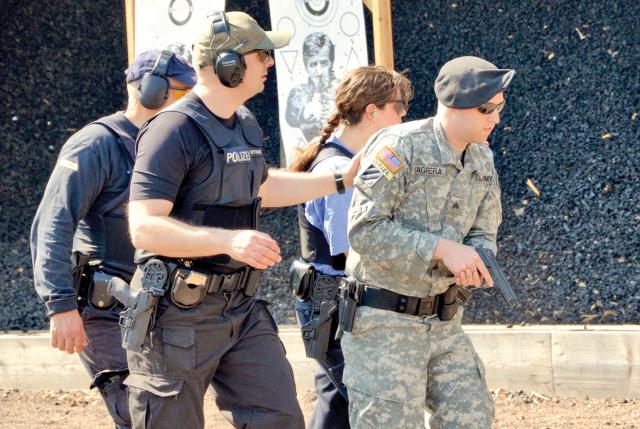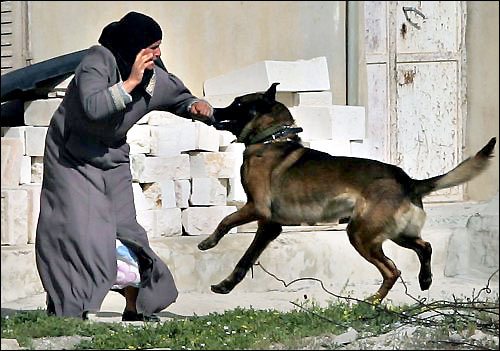Deadly incidents such as shootings at the Frankfurt, Germany, Airport, in Tucson, Ariz., and at Fort Hood, Texas, reinforced the need for local Military Police and German Polizei to carry out specialized training.
Joint training on how to effectively respond to an active shooter situation took place April 18-20, 2011, with the city and U.S. Army Garrison Wiesbaden police officers.
“SWAT teams are not realistic in situations like active shooter. Time is limited in these situations,” said Eckhard “Ekco” Niebergall, Hessen Polizei senior instructor trainer, during recent training at the Wackernheim Regional Range Complex, Germany.
“You don’t have time to take cover. We must save lives and we must go now,” said Eric Tanner, Headquarters and Headquarters Detachment, USAG Wiesbaden investigator.
The instructors from the Hessen Polizei academy took a careful approach in training the Military Police, because they are primarily trained for operating in combat zones where emphasis is on speed and volume.
“Don’t try to go too fast. This is new to some of you. Try to be fluid,” said Oliver Wittmann, Hessen training instructor, to the police officers during reflexive firing drills stressing that precision is important to ensure civilian casualties are minimized and the suspect is aptly taken down.
The training plan’s multiple objectives culminated in a comprehensive exercise that brought all drills and scenarios together.
“We must walk before we can run,” said Niebergall who said the training included “shoot-or-don’t-shoot” scenarios, positive identification drills, team formations and theory. It also introduced realistic factors of live fire, equipment familiarization and full scenarios simulating response and rapid acting.
“We push them so that they are used to working under a certain level of pressure during training,” he said.
The joint training underscored the longstanding partnership between the Hessen Polizei and USAG Wiesbaden police officers.
“We are building confidence and ability between one another,” said Niebergall. “The more often we do this, the more we minimize the barriers to having an effective response. When they train really well together, chances are that they will also fight well together.”
The training was helpful in boosting the confidence of the participants in their individual readiness and the relations between the German and American law enforcers.
“It makes you more ready for a domestic incident. It’s rounding out the corners a bit,” said Spc. Logan Cox, 148th Military Police Platoon, who worked in civilian law enforcement before enlisting in the Army. He praised the instructors for their proficiency and knowledge of the subject matter. “It is (also) interesting to see how other countries’ police departments do things.”
“It’s good to know when I’m in a real situation with the Americans, I will be OK,” said Birthe Fink, West Hessen Polizei Polizeioberkommissarin.
“I would go any day to a real situation with Soldiers from the Army,” said Wittmann, who remarked about the quick improvement they showed in training. “They listen and are willing to do what you ask, and they are open-minded.”











